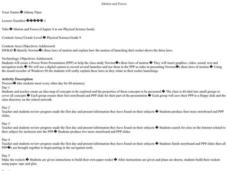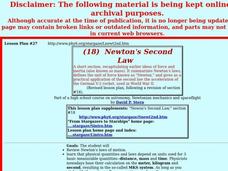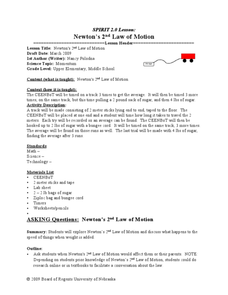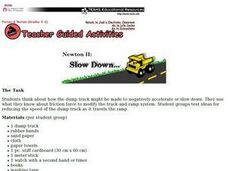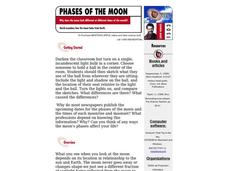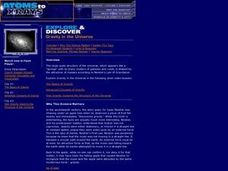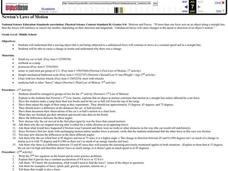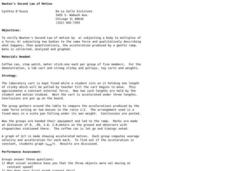Curated OER
Motion and Forces
Ninth graders create PowerPoint presentations to present Newton's three laws of motion, and make and launch rockets.
Curated OER
Physics of Flight
Learners view a PowerPoint slideshow on the basic physics of flight. They build and operate Newton cars as an illustration of these concepts.
Mr. E. Science
Our Solar System
The presentation starts with the scientists who made discoveries about our solar system: Ptolemy, Copernicus, Galileo, Brahe, Kepler, and Newton. It also covers the planets, inner, outer, and Pluto, satellites, and an in-depth discussion...
Curated OER
Sliding Mass Problems
Physics masters solve five sliding mass problems. For each, there are a few different values to be determined: normal force, force of friction, acceleration, velocity, coefficient of friction, or net force. Pupils must draw a force...
Curated OER
Walking on Water
Students use this problem to help them to relate to force vectors: Suspend a meterstick horizontally between two tables. Place a 1kg mass in the middle of the meterstick. Notice the bend of the meterstick. Explain why the meterstick...
Curated OER
Newton's Second Law
Students examine how physical quantities and laws depend distance, mass and time. They examine the MKS system; meter, kilogram and second, for doing calculations.
Curated OER
Newton's 2nd Law of Motion
Students investigate how mass affects the speed of an object. In this physics lesson, students record data on the data table and graph results. They analyze findings and formulate a conclusion.
Curated OER
Mini-labs on Newton's Laws
Students are divided into 6 groups with each group rotating to a different lab. The labs can be run over the course of a few days; or spread out for a longer period of time.
Curated OER
Newton's Laws of Motion
Learners investigate the effect of thin films to surface friction. In this physics lesson, students calculate the coefficient of friction using mathematical formulas. They discuss its importance in their everyday lives.
Curated OER
Centripetal Force
In order to investigate cetntripetal force and angular momentum, youngsters compare the motion of erasers hung from a string. It is not clear what type of Amish toy is needed in the warm up activity, so you may not be able to use it. The...
Curated OER
Force Diagrams
Seeming incomplete, this slide show introduces physical science novices to the balancing of forces and drawing force diagrams. The first seven slides work well to meet this purpose. The remaining slides, however, turn viewers over to...
Curated OER
Newton II; Slow Down
Students, in hands-on activities, explore how a dump truck might be made to negatively accelerate or slow down. They participate in activities using friction force to modify the truck-and-ramp system. Student groups test ideas for...
Curated OER
Phases of the Moon
Young scholars explore why when you examine the moon depends on its location in relationship to the sun and Earth. The moon never goes away or changes shape-we just see a different fraction of sunlight being reflected from the moon to...
Curated OER
Gravity In The Universe
Students assess and explore gravity in the Universe via several short video lessons. They analyze why this science matters and the history of Sir Isaac Newton's law of gravity. A variety of questions are asked within this lesson for each...
Curated OER
Action and Reaction
Students experiment with Newton's Third Law of Motion. In this physics and motion lesson, students complete two experiments to illustrate force and its equal and opposite reaction. Students first work in pairs to exert an equal force on...
Colorado State University
Why Are Clouds White?
Is it possible to change the color of clouds? A three-part activity explores the scattering of light by the water droplets that make up clouds. After observing a demonstration, curious scholars conduct their own investigations of the...
American Museum of Natural History
Meet the Universe's Main Attraction ... Gravity
Learners read a short description about gravity and what it does and then explore the two ideas about how gravity works. After gaining a better understanding of the concept, individuals participate in a thorough experiment on what would...
Curated OER
Newton's Earthquake
Students discuss Newton's 2nd and 3rd laws using the example of a football linebacker and a small child pushing against each other on an ice rink. Students are able to visualize the results of the push and link it to the laws. Discussion...
Curated OER
Newton’s Laws of Motion
Eighth graders explore the three laws of motion. For this physics lesson, 8th graders observe teacher demonstration and explain what happened in terms of Newton's Laws. They complete worksheet at the end of the lesson.
Curated OER
Looking for Newton
Pupils discuss the rhyming pattern of various types of poetry. With a focus on limericks, they follow the specific rhyme scheme and create a limerick about Newton. They share their poem with the class and write another one related to his...
Curated OER
Newton's Third Law
Students use inquiry and observation to explore Newton's third law of motion: for every action there is a reaction. In this physics lesson, students rotate through six stations set up with materials and picture directions illustrating an...
Curated OER
Looking For Newton
The instructional activity has sufficient background information for the teacher to implement the instructional activity. Students are asked to summarize the three laws of motion. They also conduct classroom activities to role play the...
Curated OER
Newton's Laws of Motion
Students perform three activities that each demonstrate one of Newton's Laws of Motion. They use a ramp and toy car to demonstrate inertia, calculate acceleration due to gravity, then use a medicine ball and rolling chair to demonstrate...
Curated OER
Newton's Second Law of Motion
Sixth graders study Newton's second law of motion and verify it. For this force and motion lesson students complete a lab activity and collect data, analyze it and graph it.
Other popular searches
- Sir Isaac Newton Apples
- Sir Isaac Newton. Acceleration
- Sir Isaac Newton Space
- Sir Isaac Newton Acceleration


